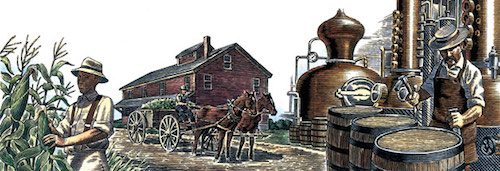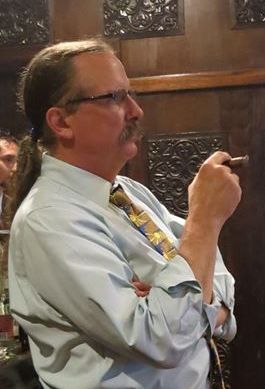
|
| presents
|

|

|
|
FREE and
ONLINE
Tuesday, May 5, 2020, 5:30-7:00 pm CDT
|
|
There will be a Q&A
session after the lecture. Audience
participation is invited.
Be
sure to have your cocktails and
cigars at ready hand.
Register for this event.
|
|
Whiskey distilling is
as American as apple pie. George
Washington’s distillery at Mount Vernon
was by 1799 producing nearly 11,000
gallons of whiskey a year, making it one
of the largest distilleries in America at
the time. Andrew Jackson was distilling
whiskey just outside of Nashville,
Tennessee at the same time. Farmers often
distilled whiskey because it was far
easier to transport alcohol to market by
horse and wagon than their bulky grain
harvests. The first Federal excise tax,
the so-called Whiskey Tax (by then
treasury secretary Alexander Hamilton),
was so despised by farmers that it led to
the Whiskey Rebellion. The militia were
required to suppress the uprising and
Thomas Jefferson eventually abolished the
law in 1802.
Tax-free whiskey production
experienced incredible growth. Meanwhile,
American farmers were crossing the
Appalachian Mountains and settling in an
area now known as Kentucky. The natural
resources of the region were uniquely
positioned for the distilling industry -
limestone-filtered water, fertile soil
that yielded exceptional corn, vast oak
forests to be used for the construction of
barrels, and
easy access to rivers to ship whiskey by
flatboat to St. Louis and New Orleans.
Bourbon became the type of whiskey
produced in the region. It’s uniquely
American with unique whiskey
characteristics - high corn in the mash
for subtle sweetness, water that enhances
fermentation and barrel interaction, and
the contribution of wood-derived flavors
in the finish. And thus, the Kentucky
Bourbon industry was established. However,
over the years, the industry experienced
considerable quality control issues,
business consolidations, fires and
mishaps, changes of distillery ownership,
and a decline of consumer interest in
bourbon. And, of course, prohibition got
in the way. But now, in the wake of the
successful craft brewing revolution, state
laws have slowly changed, and small
distilleries have sprung up. Products from
these micro distillers helped to revive an
interest in all distilled beverages. And
bourbon has again become extremely
popular. This has led to a vast array of
new whiskey products from both the old
legacy distilleries and the small new
upstarts.
This presentation, will explore the
history of American whiskey, distilling in
Kentucky, the production of bourbon, the
different types of stills and how they
work, the various types of whiskey and
bourbon, The Kentucky Bourbon Trail,
traditional bourbon distilleries, new
micro distilleries, bourbon in the market,
evaluating bourbon, and the blending of a
barrel of bourbon. Whew! So grab a cigar
and your favorite whiskey glass, pour a
double, find a comfy chair, sit back, and
enjoy. And keep that bottle of bourbon
nearby!
|
|

|
Ed
Bronson has been an
active member of the Cigar Society
for almost 20 years. As a
bioengineer, he formed a startup
to do computer-based
pharmaceutical drug testing. Upon
retuning to Purdue University, he
earned a PhD in electrical
engineering specializing in
artificial intelligence and
parallel computing. After a
National Science Foundation
postdoc in molecular biology, he
worked at Bell Laboratories on
digital signal processing for
speech recognition. He then moved
on to Oracle to build and run a
telecommunications and speech
processing laboratory.
Ed has always had a strong
interest in beverages. Serving as
a certified beer judge for over 30
years, he has judged beer
competitions across the country.
He studied brewing and distilling
at the prestigious Siebel
Institute of Technology and was
the brewmaster for the Taylor
Brewing brewpub in Naperville.
More recently, he was the first to
complete the Illinois Craft
Distillery Trail and has finally
blended a barrel of Woodford
Reserve Bourbon.
|
|
|
|
About
the
Cigar Society of Chicago
ONE OF THE OLDEST AND
greatest traditions of the city clubs of
Chicago is the discussion of intellectual,
social, legal, artistic, historical,
scientific, musical, theatrical, and
philosophical issues in the company of
educated, bright, and appropriately
provocative individuals, all under the
beneficent influence of substantial
amounts of tobacco and spirits. The
Cigar Society of Chicago
embraces this tradition and extends it
with its Informal Smokers, University
Series lectures, and Cigar
Society Dinners, in which cigars,
and from time to time pipes and
cigarettes, appear as an important
component of our version of the classical
symposium. To be included in the
Cigar Society's mailing list, write to the
secretary at
curtis.tuckey@logicophilosophicus.org
|
|
|